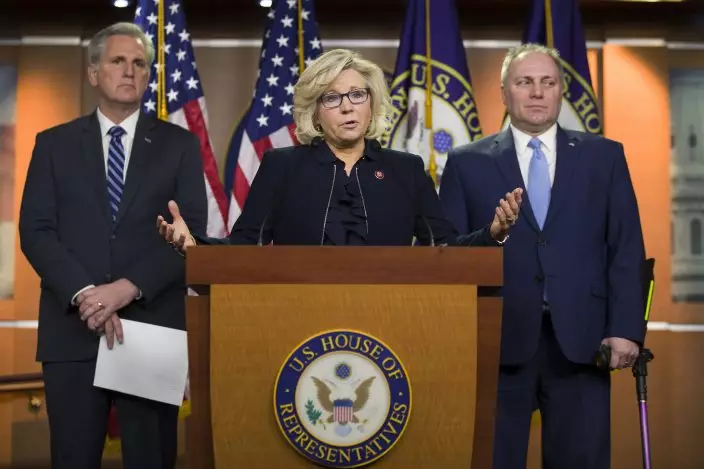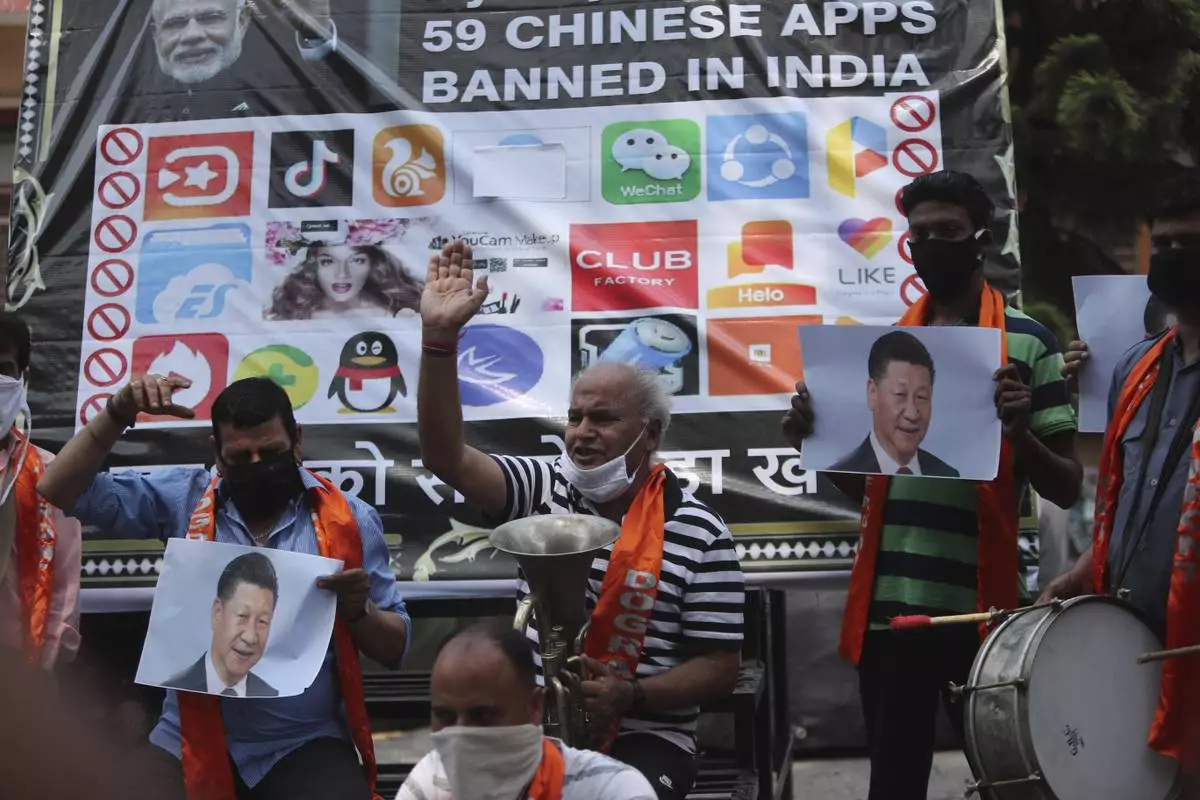She used to be known mostly for her vice presidential family lineage. But Rep. Liz Cheney, the third-most senior House Republican, is cutting a new path as the first GOP leader to call Rep. Steve King's remarks "racist" and call explicitly for his resignation.
"I'd like to see him find another line of work," Cheney, 52, told reporters on Tuesday.
It was the latest example of Republicans, toppled from the House majority in November's elections, taking a tougher and more uniform approach to racist remarks — at least by those in their own ranks. King had for years rankled the GOP with remarks about race as they watched blacks and Hispanics vote overwhelmingly for Democrats. All along, Republicans issued muted, if any, disapproval. And they're still reticent about how to respond to the leader of their party, President Donald Trump, and his remarks on race.

House Republican Conference chair Rep. Liz Cheney, R-Wyo., center, accompanied by House Minority Leader Kevin McCarthy of Calif., left, and House Minority Whip Steve Scalise of La., speaks at a news conference on Capitol Hill, Tuesday, Jan. 15, 2019 in Washington. (AP PhotoAlex Brandon)
But House and Senate Republicans said the final straw came last week with King's quote in The New York Times.
"White nationalist, white supremacist, Western civilization — how did that language become offensive?" King mused in the paper.
Within hours, Cheney denounced his remarks on Twitter, in terms rarely if ever used by GOP leaders.
"These comments are abhorrent and racist and should have no place in our national discourse," she tweeted Jan. 10, reposting a news story that named the Iowa congressman. House Republican Leader Kevin McCarthy and House GOP Whip Steve Scalise likewise condemned King's remarks and barred him from committee seats. The House on Tuesday voted overwhelmingly to formally rebuke King. But Cheney is the only one of the three to call for King's resignation.
The only lawmaker to vote no was Illinois Democrat Bobby Rush, who wanted a stronger censure against King. But even he has noticed Cheney, in a good way.
"Liz Cheney, I commend her," Rush said in a brief interview.
"She was very clear," about what how she wanted to handle the King issue, McCarthy said of Cheney in a brief interview.
Clear, sometimes with a sharp edge, is the word on the two-term Wyoming congresswoman — an attorney, mother of four and daughter of former Vice President Dick Cheney. Like her father, Cheney was elected by her peers to chair the Republican Conference.
Cheney's ascent puts her in prime position to influence the party's branding strategy with GOP voters who fondly recall the George W. Bush presidency, especially those who favor a strong national defense. But as a woman in leadership, she'll also have a role in deciding how to bridge, or at least not exacerbate, the gender and diversity gaps between Republicans and Democrats. After the midterm elections, the ranks of House Republican women declined to only 13.
The arc of Cheney's political career reflects her reputation for doggedness. Five years ago she launched an ill-fated campaign to oust Wyoming's popular Republican senior senator, Mike Enzi. Labeled a carpetbagger for having moved to Wyoming from Virginia barely a year earlier, Cheney made things worse by feuding publicly with her openly gay sister about gay marriage.
She left the race eight months before the primary but didn't give up on politics. She continued touring Wyoming, in some cases mending the relationships she needed to dominate a crowded GOP House primary two years later.
Even before she was elected to the leadership post for this Congress, Cheney was clear about what she saw as the party's need for a quicker, more forceful communications strategy under Democratic rule.
"We've got to change the way that we operate, and really in some ways be more aggressive, have more of a rapid response," Cheney told The Associated Press in November.
Cheney's father won the conference chair more than 30 years ago after four terms as Wyoming's congressman. By landing the position after just one term, Cheney left little doubt that she's a rising political star in her own right.
"He told me not to screw it up," Cheney told reporters after she was elected to the leadership post, with her father looking on.
Follow Kellman on Twitter at http://www.twitter.com/APLaurieKellman
NEW DELHI (AP) — The hugely popular Chinese app TikTok may be forced out of the U.S., where a measure to outlaw the video-sharing app has won congressional approval and is on its way to President Biden for his signature.
In India, the app was banned nearly four years ago. Here's what happened:
In June 2020, TikTok users in India bid goodbye to the app, which is operated by Chinese internet firm ByteDance. New Delhi had suddenly banned the popular app, alongside dozens other Chinese apps, following a military clash along the India-China border. Twenty Indian and four Chinese soldiers were killed, and ties between the two Asian giants plunged to a new low.
The government cited privacy concerns and said that Chinese apps pose a threat to India’s sovereignty and security.
The move mostly drew widespread support in India, where protesters had been calling for a boycott of Chinese goods since the deadly confrontation in the remote Karakoram mountain border region.
“There was a clamour leading up to this, and the popular narrative was how can we allow Chinese companies to do business in India when we’re in the middle of a military standoff,” said Nikhil Pahwa, a digital policy expert and founder of tech website MediaNama.
Just months before the ban, India had also restricted investment from Chinese companies, Pahwa added. “TikTok wasn’t a one-off case. Today, India has banned over 500 Chinese apps to date.”
At the time, India had about 200 million TikTok users, the most outside of China. And the company also employed thousands of Indians.
TikTok users and content creators, however, needed a place to go — and the ban provided a multi-billion dollar opportunity to snatch up a big market. Within months, Google rolled out YouTube Shorts and Instagram pushed out its Reels feature. Both mimicked the short-form video creation that TikTok had excelled at.
“And they ended up capturing most of the market that TikTok had vacated,” said Pahwa.
In India, TikTok content was hyperlocal, which made it quite unique. It opened a window into the lives of small-town India, with videos coming from tier 2 and 3 cities that showed people doing tricks while laying down bricks, for example.
But for the most part, content creators and users in the four years since the ban have moved on to other platforms.
Winnie Sangma misses posting videos on TikTok and earning a bit of money. But after the ban, he migrated to Instagram and now has 15,000 followers. The process, for the most part, has been relatively painless.
“I have built up followers on Instagram too, and I am making money from it, but the experience isn’t like how it used to be on TikTok,” he said.
Rajib Dutta, a frequent scroller on TikTok, also switched to Instagram after the ban. “It wasn’t really a big deal,” he said.
The legislation to outlaw the app has won congressional approval and now awaits a signature from Biden.
The measure gives ByteDance, the app’s parent company, nine months to sell it, and three more if a sale is underway. If this doesn’t happen, TikTok will be banned. It would take at least a year before a ban goes into effect, but with likely court challenges, it could stretch longer.
In India, the ban in 2020 was swift. TikTok and other companies were given time to respond to questions on privacy and security, and by January 2021, it became a permanent ban.
But the situation in the U.S. is different, said Pahwa. “In India, TikTok decided not to go to court, but the U.S. is a bigger revenue market for them. Also, the First Amendment in America is fairly strong, so it’s not going to be as easy for the U.S. to do this as it was for India,” he said, in reference to free speech rights in the U.S. Constitution.
As Chinese apps proliferate across the world, Pahwa says countries need to assess their dependency on China and develop a way to reduce it as the apps can pose a national security risk.
The app is also banned in Pakistan, Nepal and Afghanistan and restricted in many countries in Europe.
“Chinese intelligence law and its cybersecurity law can allow Chinese apps to work in the interest of their own security. That creates a situation of distrust and it becomes a national security risk for others,” said Pahwa.
“There should be different rules for democratic countries and for authoritarian regimes where companies can act as an extension of the state,” he added.
—-
This story corrects the expert's erroneous reference to Fourth instead of First Amendment.

FILE- Activists of Jammu and Kashmir Dogra Front shout slogans against Chinese President Xi Jinping next to a banner showing the logos of TikTok and other Chinese apps banned in India during a protest in Jammu, India, July 1, 2020. (AP Photo/Channi Anand, File)











